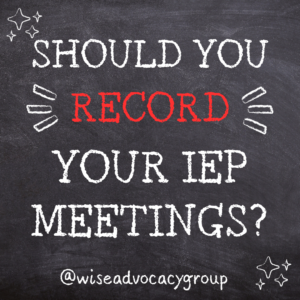 In Special Education, the IEP (Individualized Education Program) meetings are pivotal gatherings that shape a student’s educational path. As both an advocate and parent, I’ve witnessed the complexity and importance of these meetings in my family and the lives of families I’ve worked with. Picture a conference room with educators, parents, and students gathered around a table, engrossed in discussions. These discussions involve a wealth of information and decision-making. Recommendations and accommodations are proposed, adjusted, and reevaluated throughout the meeting. Decisions are made, sometimes revised, and the meeting concludes with a sense of both progress and lingering uncertainties. However, amidst the discussions, a question arises: Should you press ‘record’?
In Special Education, the IEP (Individualized Education Program) meetings are pivotal gatherings that shape a student’s educational path. As both an advocate and parent, I’ve witnessed the complexity and importance of these meetings in my family and the lives of families I’ve worked with. Picture a conference room with educators, parents, and students gathered around a table, engrossed in discussions. These discussions involve a wealth of information and decision-making. Recommendations and accommodations are proposed, adjusted, and reevaluated throughout the meeting. Decisions are made, sometimes revised, and the meeting concludes with a sense of both progress and lingering uncertainties. However, amidst the discussions, a question arises: Should you press ‘record’?
Recording IEP meetings has emerged as a powerful tool for achieving clarity, accuracy, and accountability in the special education process. There are many advantages and potential drawbacks of recording IEP meetings, as well as legal and practical considerations to make before deciding what is best for you, your child, and their education.
OSEP’s Guidance and Tennessee’s Single-Party Consent Laws
Tennessee is considered a “Single party consent state,” meaning only one party is required to give consent to record conversations if you are a contributor, or with prior consent with one of the involved parties, barring any criminal intentions (Tenn. Code Ann. § 39-13-601 & Tenn. Code Ann. § 39-13-604 & Tenn. Code Ann. § 40-6-303). As a member of the IEP team, you are a contributor to the conversation, provided you are present for the meeting.
While the Individual’s with Disabilities Education Act (IDEA) itself does not explicitly grant caregivers the right to record IEP meetings, the Office of Special Education Programs (OSEP), has indicated that recording can be seen as a means to ensure parents have the opportunity to fully participate in the process. IDEA requires schools to provide parents with “the opportunity to participate,” and this principle can be interpreted as allowing parents to use recording as a tool to facilitate their participation.
OSEP’s guidance essentially recognizes that recording can serve as a way to level the playing field in IEP meetings and be used as a tool to ensure the caregiver fully understands their child’s IEP. These meetings can be complex and emotionally charged, and caregivers may need the assistance of a recording to review and understand the discussions effectively. If your school district has a specific policy on recording IEP meetings, exceptions must be made to permit recording with prior notice when used to allow the caregiver to better understand the IEP and decisions made. (OSEP Letter to Anonymous dated June 4, 2003, OSEP Letter to Diana M. Savit, Esq. dated January 19, 2016, and in Appendix A to the 1999 IDEA Part B regulations (64 Fed. Reg. 12406, 12477 (Mar. 12, 1999))
Benefits vs. Risks
As a parent, I have personally recorded numerous IEP meetings. This has proven to be an asset for my family when attempting to correct an IEP that was finalized with inaccurate information. There were many decisions and changes made during a long IEP meeting. Unfortunately, some of those changes did not make it into the final IEP, however, other changes that were not discussed were documented. The recorded meeting provided a clear record of the discussions and decisions that were (and were not) made, ensuring that the IEP could be corrected to truly meet my daughter’s needs. The recordings serve as an impartial witness to what was agreed upon and what options were considered and can also be beneficial for use in administrative complaints or due process hearings, should concerns not be resolved at the school or district levels.
Recording IEP meetings offers several advantages:
- Enhanced Accuracy and Accountability: Recordings provide an undisputed account of the meeting, ensuring that commitments and plans are accurately documented.
- Improved Understanding: Parents and students can revisit the meeting, absorb the details at their own pace, and better grasp the content and implications of the IEP.
- Evidence in Disputes: In the event of disputes or legal challenges, a recording becomes a valuable piece of evidence, preserving the original intentions and agreements.
- Educational Empowerment: For students, listening to their IEP meetings can be an educational tool, fostering self-advocacy, independence, and a deeper understanding of their own needs.
However, there are concerns to weigh:
- Inhibited Discussion: Some argue that the presence of a recording device may stifle open and candid conversation among team members.
- Administrative Formality: Recording can introduce an element of formality, potentially discouraging spontaneous and creative problem-solving.
- Adversarial Relationships: In already terse relationships, recording meetings can be viewed as adversarial and put team members in a defensive position.
While the advantages of recording are evident, it’s essential to approach this tool with care. Informing the school in advance, understanding the laws, and respecting the comfort levels of all involved parties can help harmonize the process.
Recording IEP meetings can be a powerful asset in the toolkit of effective advocacy and a means to ensure accurate documentation. Nevertheless, it’s important to remember that it’s only one part of a broader strategy that encompasses informed advocacy, support, and a steadfast commitment to the best interests of the child.
Disclaimer: I am a non-attorney advocate. The information provided here is for educational purposes only and should not be considered legal advice.
